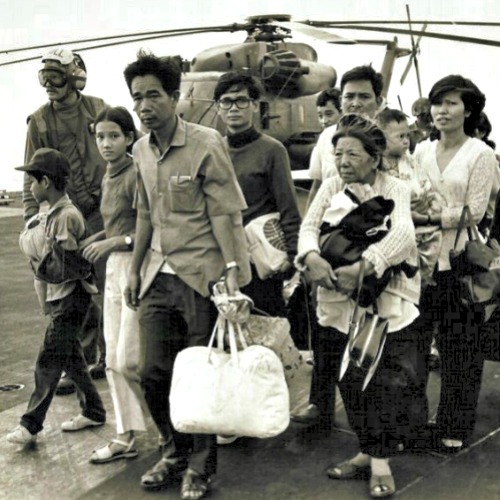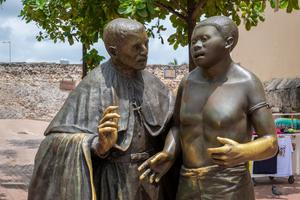Stories of Death, Exile and Miracles Mark 40th Anniversary of Saigon’s Fall
Catholic survivors of the chaotic event recall how their faith was formed and strengthened, amid the maelstrom of the communist takeover of South Vietnam.

ARLINGTON, Va. — Phuong Le was just 10 years old in April 1975, when she heard her father, a two-star general in the South-Vietnamese Army, tell her mother, “We are losing Vietnam.”
“My dad told my mom we might not see him again and that he would continue fighting until the end,” Le told the Register.
She would not see her father, Gen. Le Minh Dao, for 17 years. He was imprisoned after North Vietnam secured its military victory, and his large family also endured brutal conditions in prison, before they escaped the country and immigrated to the United States.
She credits their survival to a series of “miracles,” capped by the conversion to Catholicism of half the family.
Le’s tale of trauma, exile and family separation is echoed in the stories of many Vietnamese immigrants who found a safe haven in the U.S. after the fall of Saigon on April 30, 1975. Many were sponsored by Catholic and Protestant churches that offered homes and facilitated access to education, jobs and other social services.
That help was reciprocated: Today, 500 Vietnamese-born priests serve the Church in this country, and 12% of young men in priestly formation come from Vietnam, according to the U.S. Conference of Catholic Bishops.
Tragedy dogged many refugees, especially the tens of thousands of “boat people,” who faced rough seas and Thai pirates in their flight from communist rule. Children saw relatives perish in the sea and others captured by pirates to be raped and sold into prostitution.
South-Vietnamese Catholics, including the estimated 500,000 now living in the United States, have never forgotten the historic events and personal struggles of this period. But they also remember the “miracles” that allowed them and their loved ones to survive against all odds and nurtured their faith in the darkest hours.
Flight by Sea
Rose Phan, now age 56, was a teenager immersed in her studies at a Catholic girls’ high school in Saigon when the capital fell to the North Vietnamese.
“The streets were chaotic, and there were gunshots celebrating the victory,” Phan told the Register.
“Events happened too fast. Nothing was verbalized, but we could sense that everything had changed.”
Her father, a Catholic convert and a successful businessman who had worked his way up from humble roots, bribed someone to secure a boat for their escape.
But her father was betrayed and sent to prison, where Phan said he was tortured.
By 1976, however, her father was back with his family, planning another escape that involved “94 people, including babies, young people and my great-grandmother.”
On a rainy day, the group went to a hideout near a river, a few hours from Saigon.
“The larger boat needed for the longer journey didn’t show up. My father feared that something would go wrong, but he decided to move on, using the two boats we had.
“He was a great leader. Everything he did was for the sake of others.”
Those gifts would be put to the test as their group embarked on a dangerous journey witout sufficient provisions, fearful that they could die of thirst.
It was then that the frightened young refugee felt the hand of Providence.
“There was a big storm, after we ran out of water, and, looking back, I can see that was my first miracle,” she said.
“I was grasping the edge of the boat, so I wouldn’t be thrown off, and trying to hold a container to capture the water. I don’t know how I survived the storms.”
Then they were taken prisoner by some North Vietnamese, who manned a boat patrolling the waters off the coast. Yet again, a series of quick decisions and lucky breaks resulted in the refugees taking control of the boat and reaching Thailand in safety.
After two months in a refugee camp, the family immigrated to the United States in August 1976, settling in southern California.
‘Pray to Mother Mary’
While studying at UCLA, Rose met her future husband, Minh Van Phan, who had fled South Vietnam as the communists prepared to take Saigon.
Van Phan was just 6 years old when he witnessed the execution of his father, a devout Catholic, in front of the family home in Hoa An Village, in the south-central part of the country.
It was 1963, and the family — the only Catholics in the village — had been targeted by local communists.
“The last conversation I heard before my father was killed were his words, ‘Pray to Mother Mary.’ Then he pushed my sister and me under the bed, where I could see what happened.”
After his father’s assailants left, Van Phan went out and “shook my dad. He didn’t move.”
That searing moment shadowed his early life, as he went on to study at a seminary high school run by the De La Salle Christian Brothers. His sister worked at the U.S. consulate and kept him informed about the steady advance of North-Vietnamese troops.
The family left South Vietnam five days before the fall of Saigon and settled in California. After he married Rose, the couple raised a family and launched and sold several successful companies.
In 1999, a Cursillo retreat revitalized their Catholic faith, and it was finally possible for Van Phan to come to grips with the death of his father. In 2000, he returned to the village where his father died.
“I saw the same house and the same coconut tree where they killed my father.”
Today, he is at peace and grateful to God and to the American people for the outpouring of help he and other refugees received when they arrived in the U.S.
This year, Van Phan will enter the deaconate program for the Diocese of Orange, Calif. But neither he nor his wife will forget the world they left behind in Vietnam, and they continue to find inspiration in the faith and courage of their fathers.
The General’s Family
Back in Virginia, Le also remembers the time when everything changed. Likewise, her words still evoke the deep yearning she felt for her missing father — the two-star general who made the fateful decision to stay in the field after the fall of Saigon.
Her father had been insistent that his family wait in Vietnam. So his wife and nine children stayed behind, as helicopters evacuated residents from the military base where they lived.
“The communists took our house because it belonged to South-Vietnamese officers. We lost everything,” she said.
The family, all Buddhists, prayed for their father’s safe return. But as time went by and they heard nothing, they began to think about an escape.
Their plan was discovered, and they were thrown in prison, under brutal conditions that Le will not discuss in detail.
It would take four more attempts, over four years, before eight of the nine siblings succeeded in leaving the country, in 1979.
Phuong Le was just 14. Her youngest brother was 7, and the oldest was 21. They left on a small boat with 165 people, buffeted by stormy weather.
“There were big waves, and we knew we could die. Thai pirate boats chased after us,” she remembered.
Meanwhile, her younger sister lay near death, burning with a fever and her belly distended.
The family begun to pray to the Virgin Mary, “because in Vietnam, we had always followed our Catholic neighbors, who brought flowers to Mary in church.”
Her sister recovered, and a big oil cargo ship arrived, forcing the pirates to flee. The ship brought them to an island off Indonesia, and from there, they were brought to the U.S. Another brother would arrive later on, after a long ordeal
“That is how we converted to Catholicism,” explained Le, who said that about half of the siblings had been baptized in the Church in the years after their arrival.
Reunited With Their Father
They completed school and began to work, aided by the Diocese of Arlington, Va., which had sponsored the family.
Later, they learned their father had survived and was incarcerated in a communist re-education camp, where he converted to Catholicism in 1980.
In 1992, her father and two other South-Vietnamese generals were finally released from prison, following negotiations linked to the lifting of the U.S. embargo and a long campaign to secure his release.
When she was able to speak with him, “He said he had prayed to Mary every night. He felt guilty that he kept us all there, and we all had suffered.”
Later, she met the priest who guided his religious conversion while both were in prison, Father Tran Quy Thien, who has since died.
“In prison, my father was tortured — they locked him up in a box — after they found out we had made it to U.S.,” she said.
“Many of his friends died in prison, but he stayed strong because he wanted to come home to his family, and he prayed that, someday, God might shine a light to guide him there.
“He had given his life over to God and accepted God’s will for him.”
Now, 40 years after her father said good-bye to his family and returned to the field, what matters is that “we survived. We made it. I am a daughter of God now, the daughter of Jesus.”
Joan Frawley Desmond is the Register’s senior editor.
- Keywords:
- catholic church
- communism
- diocese of arlington
- fall of saigon
- joan frawley desmond
- refugees
- u.s. marines
- vietnam war
- virgin mary














